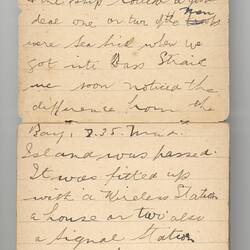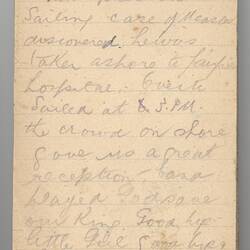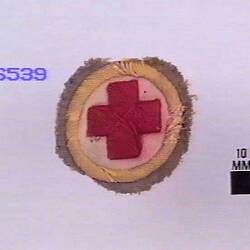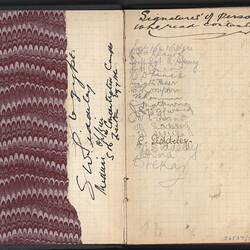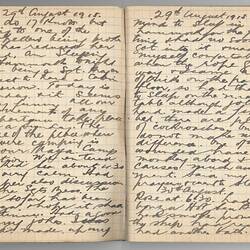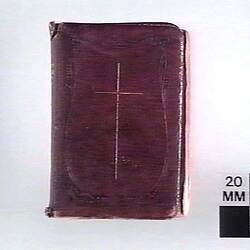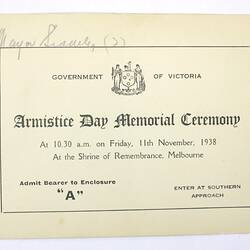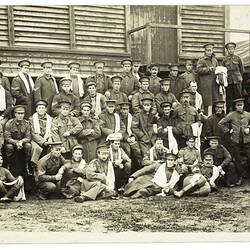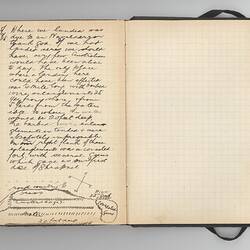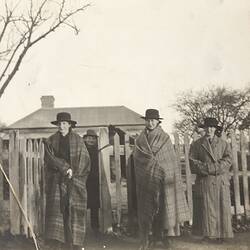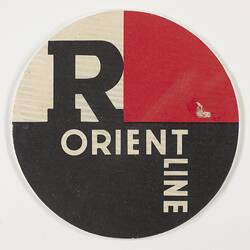Summary
Diary written by Corporal S.W. Siddeley. Coverless first volume of a diary consisting of three notebooks, written between October 1914 and September 1915. The diary covers the first convoy, the landing of the Anzacs at Gallipoli and the campaign there. His diary contains graphic details of the landing at Gallipoli and the wounds of many, and his work in a field hospital on the peninsula.
This first volume covers the period 21 October 1914 to 15 January 1915, and deals primarily with Siddeley's time on board H.M.A.T Orvieto (part of Australia's First Expeditionary Force convoy), travelling to the A.I.F. training camp at Mena, near Cairo, Egypt, before travelling to the Gallipoli Peninsula for the Anzac campaign there. At this stage S.W. 'Sax' Siddeley is a Corporal Medical Officer attached to the 5th Battalion. Aboard the ship Siddeley's chief concerns and duties are the health of the troops on board, with numerous cases of influenza, measles and pneumonia. He is involved in hospital maintenance and care of soldiers, such as after a private's appendix operation on 4 November 1914 (p.7).
Siddely also reports tremendous difficulty in working with Captain Lewers, his superior Medical officer, who he finds ineffectual as an officer over the men (pg.7-8). Later this leads him to resign from his post and have six days' rest; he is however to be re-instated upon landing on the 25 November 1914 (p.26). He also comments that his eyes at this stage are very bad, suggesting an ongoing condition for his later discharge.
Landing at Port Said, Egypt, on the 1 December 1914, Siddeley visits Cairo and Alexandria briefly on 'French Leave' (unauthorised leave) before he and fellow troops arrive via train at Mena Camp, on the 5 December 1914 (pp. 29-31). From then on the entries detail marching in the desert, sleeping without tents and day to day life at the camp, as well as excursions to Cairo; sightseeing the Pyramids, enjoying leave and observations of inhabitants and surroundings. The 5th Battalion continues to battle influenza, however, with '60 out of 1,000 men in Hospital with Influenza' (p. 33.) Inoculations for smallpox are also given to the battalion. Discipline continues to be an issue, with strikes and threats of strikes (p.45). Christmas Day sees the A.I.F. soldiers becoming merry, with the concluding pages of this volume given to notes about pay and punished officers.
Physical Description
Hand-written diary without cover, hinged at top, with stitch binding. Ruled with faint lines. Written in combination of pencil and pen.
Significance
Personal diaries provide a valuable insight into the daily life in the Australian armed forces. Some diarists record the mundane routines of daily life in military camps, or ports visited during voyages on transport ships; others provide graphic details of battles and medical treatments. Welcome letters and parcels from home are described, and friendships are recorded. Many soldiers complain about the food, or record welcome or festive meals such as Christmas. The diaries show many of the ways servicemen and women coped with the discipline, stress and tragedy of war.
More Information
-
Collection Names
Military Memorabilia Collection, Returned and Services League (RSL) Collection
-
Collecting Areas
Home & Community, Medicine & Health, Public Life & Institutions
-
Acquisition Information
Donation & Subsequent Transfer from Victorian Branch, Returned & Services League of Australia Limited (RSL), Mrs Ethel C. Siddeley, Oct 1984
-
Author
Corporal S. W. Siddeley - Australian Imperial Force (AIF), Egypt, 1914-1915
-
Ship Named
-
Inscriptions
[Extensive hand-written text]
-
Classification
-
Category
-
Discipline
-
Type of item
-
Overall Dimensions
7.3 cm (Width), 0.8 cm (Depth), 12.3 cm (Height)
-
References
National Archives of Australia hold enlistment and other papers relating to Siddeley - Series number B2455, Barcode 8083551. Further information on Siddeley's diary is available on Museum Victoria's Imagining Australia 1914-1918 web site at [Link 1] National Archives of Australia also hold Department of Veteran's Affairs Repatriation Department Medical files and Hospital files on Siddeley, post-war, Series number B73/51, Barcode 12848064, and B73, 12848204.
-
Keywords
Psychiatric Patients, Wars & Conflicts, World War I, 1914-1918, Shipboard Travel, Making History - War Diaries and Correspondence

